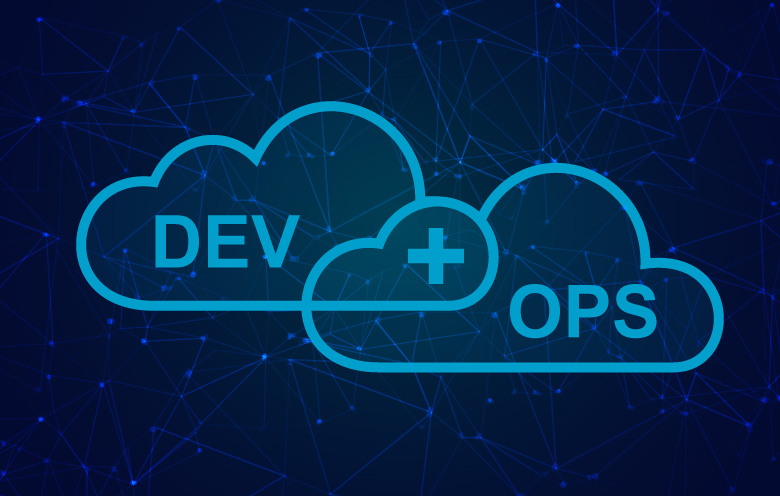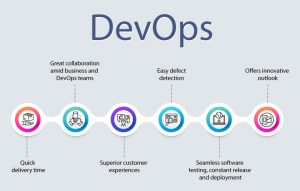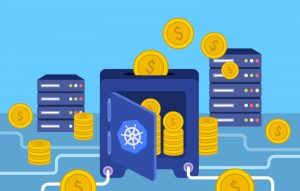The rise of competition and market demand has made it mandatory for businesses to maintain agility and hence the need for digital transformation has increased. This has compelled companies to shift from on-premises infrastructure to the cloud for improving operational costs, enhance disaster recovery, develop scalable solutions, adhere to compliance, etc.
The shift to the cloud is beneficial, but along with it, companies also need to make sure that their development and operations teams work in proper association with each other for quick and better delivery of results. This is imperative with respect to the present market requirements like time-to-market, releases, real-time monitoring, testing and so on.
Here, we would introduce the concept of DevOps, which is described as a cultural shift with the help of which you can develop, deliver and deploy software solutions via automation.
DevOps and cloud are such crucial components of the cycle of software development that cannot be separated from each other. Let’s quickly take a glance at the association amid these two:
Why DevOps and cloud must be used together?
DevOps is capable of commanding new methods for cloud development. The cloud enterprise specialists exclusively depend on DevOps systems for faster deployment and scaling the business. This is because of its appropriate procedure of development, testing and operations. Not only DevOps is simple, but it also speeds-up the pace of the deployment process by its simple approach of deployment of software systems and tools.
Apart from this, organizations have to bring hardware and software-based resources and manage them to fulfill their business needs. DevOps can’t handle it all alone. So, in order to manage these important resources and increase the pace of development and deployment of applications, companies need to include cloud systems as well. So, DevOps and cloud go hand-in-hand.
Hence, the future of cloud computing can’t be foreseen to thrive without DevOps systems in place. This is because, without agility and speed, it would become almost impossible for businesses to fulfill customer demands considering the diversity in their requests nowadays.
Let’s take a look at the benefits that cloud and DevOps collaboration would bring to the table:
Ease of automation
DevOps helps engineers to interconnect, collaborate, automate processes, etc. Automation is one of the most significant aspects of infrastructure management. Leveraging cloud to automate processes supports in increasing speed of automation, enhances the reliability of the process, abolishes errors, increases the efficiency of the process and leads to faster time to market.Though cloud providers offer a variety of tools and services that help you to manage your infrastructure and resolve several use cases, still it becomes difficult to manage the infrastructure without DevOps, for the reason that DevOps is embraced with practices like server management, OS patching, CI/CD to automate development, delivery, testing, report generation, deployment and more.
The DevOps software market is projected to grow from $2.9 billion in 2017 to $6.6 billion in 2022 – Estimates from IDC
Faster deployment
The cloud is well-known for its fast deployment. But setting it up alone is challenging and hence it becomes important to leverage DevOps along with the cloud for smooth processing. DevOps provides tools that support the automation of the process via click build tools that remove the errors by interacting with cloud service applications.
Organizations that automate their IT processes with cloud computing are able to deploy the code faster. But again, they need DevOps to ensure error less and customized deployment. DevOps helps businesses to build custom logic and easily resolve any arising issue in their infrastructure.
Better monitoring
The cloud providers centralize all the crucial tools needed for a project via cloud computing. This supports DevOps teams to easily access all the tools that they require for infrastructural services, monitoring, backup, automation, etc. Companies must use DevOps to monitor and keep track of these tools as it is essential to use these tools for the success of software. Leveraging DevOps would help developers optimize these tools and make their efficient use by generating custom alerts.
Cloud server replication
Considering unfavorable scenarios and other risks to the process as a data breach, etc., every cloud provider offers some backup procedure. But still, to restore the backup on a different environment, we need to launch the servers manually. Here DevOps comes as a savior. DevOps can automate this process and save you from the tedious task of launching the servers manually.
For example, with load testing, you can easily check the stability of your application whenever you experience a spike in traffic on your website.
DevOps tools also help you to outline the order of the infrastructure and their intercommunication forms. Whereas in absence of DevOps, replication becomes a highly complex job.
Conclusion
DevOps emphasizes on bringing about value quite early in project development. DevOps is an ideal method as it accelerates innovative services through constant enhancement and operational agility, may it be a large-scale project for the private sector or a national or government IT project. It provides cost-effective ways that deliver great values. The incorporation of DevOps with the cloud will transform the idea of flexibility, customer-experience and operational uniformity. To know more about how DevOps as a service will enhance the growth of your business, get in touch with our experts.









